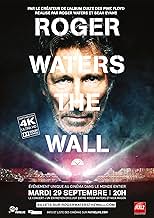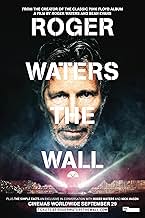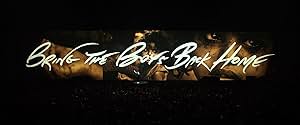अपनी भाषा में प्लॉट जोड़ेंDetails one of the most elaborately staged theatrical productions in music history as Pink Floyd frontman Roger Waters performs the band's critically acclaimed album The Wall in its entirety... सभी पढ़ेंDetails one of the most elaborately staged theatrical productions in music history as Pink Floyd frontman Roger Waters performs the band's critically acclaimed album The Wall in its entirety.Details one of the most elaborately staged theatrical productions in music history as Pink Floyd frontman Roger Waters performs the band's critically acclaimed album The Wall in its entirety.
- पुरस्कार
- कुल 1 नामांकन
- Guitars
- (as David Kilminster)
- Vocals
- (as Robbie Wycoff)
फ़ीचर्ड समीक्षाएं
37 years! Makes me feel old, because I remember buying that album at the time. Now, when I listen to a lot of the music I loved back then, it sounds pretentious and musically lame, but The Wall is one of a handful of albums that continue to be inspiring: the music is still catchy and complex, the lyrics profound, and the artistic vision monumental.
Pink Floyd was always known for the extravagance of their light shows, and Waters raises that in this concert to amazing heights. I mean "raises" literally -- the stage crew gradually build a brick wall at the front of the stage during the concert, so that by half-way through the musicians are completely obscured by a 10m wall and continue to perform behind it.
The wall has always been the central metaphor of the whole project, and Waters has worked that metaphor to the limit through multiple re-interpretations over three decades. We build personal walls to protect ourselves, but they end up isolating and imprisoning us. As he emphasised in the Berlin concert in 1990, the wall can also isolate and imprison nations.
I've always been a great fan of Talking Heads' Stop Making Sense, Laurie Anderson's Home of the Brave, and even pretty impressed with Michael Jackson's posthumous This Is It. But from a creative point of view, The Wall has a scope and attention to detail that surpasses them all. The staggering visual effects complement the storyline of the music and amplify the audacious vision that is both a commentary on war and fear, and a semi-biographical reflection on modern masculinity.
It is that last point that stood out to me as I watched the movie. The lasting value of the whole project is likely to be not the creativity, or the music, or the visual effects but the insightful portrayal of the modern western male psyche. Waters has captured the angst I feel, and I think many of my male peers feel. The ambiguity of whether walls protect or imprison. The shame of expressing emotions. The demoralising outcome of modern education. The distrust of government. The misguided aspiration for rock-star status. The disappointment that life has not delivered what we hoped for. The depressing thought they we are no more than a single brick in a huge impersonal wall.
In another review of this movie, Leslie Felperin accuses Waters of misogyny. I think Felperin is wrong about that, mistaking an honest portrayal of the male experience for a denial of the female experience. The movie is almost devoid of females. All the musicians are male. Waters' travelling companions are male apart from a brief scene with someone I presume is his daughter.
The story in the lyrics reveals a youth who had difficulty separating from a perhaps over-protective mother. The original movie (from memory) had more to say about how that psychological rut was transferred to his wife. That's coupled with an absent father. The commentary in this movie explicitly notes that war caused not only Roger Waters to grow up without a father, but that the same thing was true of his father.
Waters is a man castrated, but consciously on the journey to discover what it means to be a true man.
Along that journey he notes -- and discards -- false ideals of the masculine. Waters' repeated use of faux-Nazi characters and symbols satirically presents the emptiness of the supposedly masculine will to power. Woven throughout the piece is a criticism of the tendency to judge those who are different and the way that is ultimately expressed in the stupidity of waging war against the Other. When it comes to male attitudes to women, he notes the pathetic expression of lust for a "dirty woman", and couples that with a fear of being eaten by a vagina.
One of the best outcomes of feminism is that it has forced men to think about the meaning of masculinity. Waters hasn't resolved that here, but he clearly rejects some possibilities, and I think points towards two more helpful possibilities. In "Nobody Home" he sings "I've got wild staring eyes \ and I've got a strong urge to fly \ but I got nowhere to fly to." What I think Waters is attempting here, or at least pointing towards, is to reclaim the wild man archetype. The problem is, how does one get there from here? We feel trapped behind the wall we have conspired with society to build around our male identity. But let's at least affirm the will to break free.
The second direction Waters points to is the demolition of the wall. Sometimes it can be a conscious deconstruction; other times it is forced upon us as a shameful punishment "to be exposed before your peers." But in the end, as is clear from "Outside the Wall", we need each other.
This is preceded by a very well done filmed intro by Liam Neeson, describing his reaction to hearing The Wall for the first time, and his experience seeing the subsequent shows Pink Floyd staged in London in February of 1980, which brought back memories of the two times in 2010 that I saw Waters perform The Wall (in Tampa and Atlanta). Complete with dominant, overbearing Mother, derisive schoolmarm, dive bombers, and cracking thin ice of modern life, and marching hammers, it was one of the most amazing concerts I've ever seen (second only to Waters' own Dark Side Of The Moon tours, from 2006 and 2007, which I saw in Cleveland, LA, Hong Kong and Shanghai, Dubai, Zurich, Rio, and Philadelphia- I even met Waters and his band a couple of times. Waters, his then sax player Ian Ritchie, and guitarist Dave Kilminster was especially cordial, even going so far as to walk around the stands before the show, talking with people and taking photos with fans)
It brought back incredible memories of foreign countries and peoples, who might not even know any other words in the English language other than the words to The Wall, which they belt out right back to the band every night. The Wall's songs of isolation and loneliness are what those millions of people have in common.
Comfortably Numb was a highlight, musically and lyrically; one of the finest songs ever recorded, and it sounds even better when performed live.
This partially autobiographical concert film is rounded off with an interview session with Waters and Pink Floyd drummer Nick Mason.
My only complaint, and it's a MAJOR one, is the film began with an incredibly lengthy intro, a grey brick wall, very slowly moving to the left, very slowly, to very slowly reveal the phrase, "Please take your seats the show is about to begin", which had various non-Floyd/ Waters songs playing while it happened, and lasted for nearly 20 minutes. It was like a bad opening act who overstayed their welcome.
क्या आपको पता है
- ट्रिवियाRoger Waters told that the greatest audience was in the concert of Istanbul. However, this concert was not filmed for this movie, because the decision of which concerts will be filmed is made before gigs occurring.
- गूफ़At the final war memorial, Roger sits down with his bag beside him. He then moves to sit on a different memorial with his horn leaving his bag behind. In the new location, one camera angle incorrectly shows a bag beside him while another shows no bag.
- भाव
Roger Waters: On the tour, I invite about 20 wounded veterans to the show each night. There was one guy. And he just nodded, and then he put his hand out, and I grabbed his hand like that to shake his hand, and he wouldn't let go of my hand. So I thought: "Okay, he obviously wants to say something." And he stood there and looked at me straight in the eyes. Very kind of weird, piercing look. And then he said..."Your father would be proud of you." And it was a very weird moment. I just... I just sort of turned to jelly, really. And I felt myself welling up. I'll never forget him.
- कनेक्शनReferences Pink Floyd: The Wall (1982)
टॉप पसंद
- How long is Roger Waters: The Wall?Alexa द्वारा संचालित
विवरण
बॉक्स ऑफ़िस
- दुनिया भर में सकल
- $22,14,417
- चलने की अवधि
- 2 घं 12 मि(132 min)
- रंग
- ध्वनि मिश्रण
- पक्ष अनुपात
- 2.39:1



























